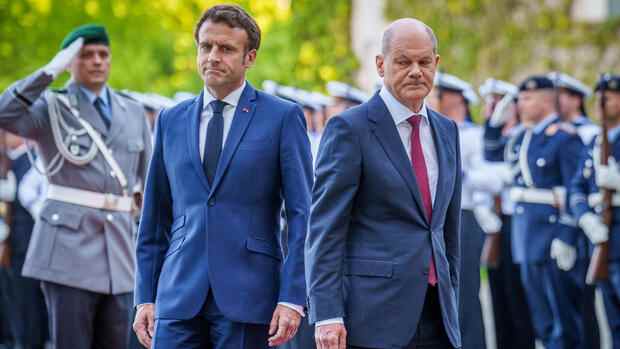Less romance, more realism in relationships would be appropriate.
(Photo: dpa)
Paris In January, Germany and France want to celebrate the 60th anniversary of the Élysée Treaty. But the conflicts before the anniversary show that the relationship between the two countries is at a low point and urgently needs a new start.
To do this, Germany and France have to say goodbye to the spirit that the Élysée Treaty breathes: as right as it was in post-war history to focus on the reconciliation narrative about two former archenemies, this narrative seems so outdated in the 2020s.
The different interests can no longer be wiped away with the Franco-German creed of friendship. A new chapter in partnership requires a better mutual understanding of differences.
Take security policy as an example: France envisions a European defense community with autonomous armaments capabilities. Of course, Paris also has the interests of its armaments companies in mind. In Germany, the understanding of security has a transatlantic component. In Berlin, however, it was quickly forgotten that just two years ago, under Donald Trump, there were great doubts about the reliability of the USA.
Top jobs of the day
Find the best jobs now and
be notified by email.
Take energy as an example: With its dependence on Russian gas, the Federal Republic of Germany has contributed to the energy crisis in Europe. Germany has done itself a disservice by criticizing French nuclear power plants, bordering on malice.
What is often overlooked is that both France and Germany are planning large investments in renewable energies. The goal must be a climate-neutral economy that relies as little as possible on energy supplies from other regions of the world.
>> Read here: “We waited for the Germans, but it got more and more silly”: France leaves the Energy Charter
Example public finances: France lived beyond its means – even if there was no crisis that justified massive expenditure. Paris is now criticizing that Germany’s protective shield for its industry in the energy crisis threatens to distort competition.
The fact that the billions are available to Berlin also has something to do with German budgetary policy. In addition, France is also spending a lot of money against the high energy prices – but households there are benefiting more than companies.
Finally, the economic models: As an export nation, Germany relies on open world markets. Rather, France seeks to insulate the industry from adverse global conditions. However, the French demand that the trading power Europe must defend itself more robustly is not wrong in view of the increasing protectionism in China and also in the USA.
The differences are not a catastrophe, the Franco-German foundation remains strong. Nevertheless, the repositioning of relationships is essential.
The guiding principle must be: less romance, more realism. Less past, more future – which of course in no way means that Chancellors and Presidents will not continue to lay wreaths in memory of the war dead in Verdun.
More: Scholz wants to settle a dispute with France – it is about these conflicts
